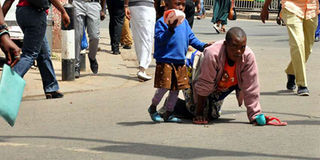Premium
Foreign beggars feed criminal networks

A person with disability begging for alms on Kimathi Street in Nairobi on January 12, 2018. The country is overrun by disabled beggars from neighbouring countries. PHOTO | FILE | NATION MEDIA GROUP
What you need to know:
- Individual Kenyans must become aware that the loose change they give the disabled beggars is not going to do them much good.
- The authorities must crack down on the gangs and repatriate, as humanely as is possible, all the foreign beggars to their countries.
Until about five years ago, Kenyan towns and cities were virtually free of disabled beggars.
The reason for this was laudable: Kenyans and their government had, over the years, taken proactive steps to integrate persons with disability (PWDs) into the society through education, vocational training and economic empowerment.
This culminated in the launch of the Cash Transfer for Persons With Severe Disabilities (PWSD) programme, formation of the National Council for Persons With Disability (NCPWD) and establishment of the Access to Government Procurement Opportunities (Agpo) initiative by President Uhuru Kenyatta in 2014.
Under Agpo, at least 30 per cent of government procurement is set aside for youth, women and PWDs to open business opportunities for these vulnerable groups.
This is the reason Kenya was chosen to host the first-ever global Disability Summit in London in 2018.
HUMAN SMUGGLING
The initiatives came after decades of marginalisation, stigma and discrimination. Finally, PWDs were getting their deserved dignity, respect and acceptance.
They were no longer lowly ‘viwete’ grovelling on the streets for handouts but respected businesspeople, professionals and artisans.
Sadly, this is being eroded as the country is overrun by disabled beggars from neighbouring countries.
Unbeknown to Kenyans, these unfortunate people are trafficked in en masse by the gangs involved in cross-border narcotics trade, smuggling and poaching.
This is why Kenyan towns and cities today are awash with beggars from as far afield as DR Congo, Rwanda, Tanzania, Burundi, Zambia and Uganda.
The Tanzanian beggars alone are in their thousands with the minders (the ones you see leading blind beggars at traffic stops or pushing the physically disabled on wheelchairs).
STATE LAXITY
This is a disgrace. It not only erodes the dignity of hard-working Kenyan PWDs but entrenches our country’s poor reputation as a human trafficking hotspot.
That they are allowed to proliferate everywhere also raises serious doubts on the government’s commitment to uphold basic human rights and our country’s dignity.
How can Nairobi become an international city and business hub, for example, with mobs of sickly beggars every 20 metres?
After working hard to uplift the dignity of its own PWDs, it is unacceptable that the government, and especially such agencies as the police, Immigration and Children’s Department, allows this open inhumanity.
No self-respecting people can allow their streets to be the playground of human trafficking gangs that flood the streets with helpless disabled victims whose only duty is to emotionally extort money from well-meaning wananchi.
For all we know, that illicit money could be used to fund terrorism.
STOP EXPLOITATION
But it gets worse. Because they are essentially slaves, many of the beggars frequently undergo unspeakable horrors at the hands of their ‘owners’.
The women and girls are routinely raped to become pregnant, because a disabled, nursing mother crawling on the streets on her backside attracts much more public sympathy — and, therefore, money.
The men and boys are routinely physically abused if they don’t meet their daily collection targets and forced to impregnate their female counterparts.
The disabled children are daily exposed to the elements, hungry, and denied an education.
That the authorities allow these evils to go on under our very noses is sickening, reprehensible and unacceptable. Unless we want to say that we are not a civilised society, this gruesome exploitation should be stopped now.
Individual Kenyans must become aware that the loose change they give the disabled beggars is not going to do them much good.
BREAK CARTELS
It ends up in the hands of a ruthless gang and only encourages another miserable soul to be trafficked to Kenya.
Donations do much more good when given to structured charities such as the Red Cross or used to pay school fees or medical bills directly for a deserving beneficiary.
While Kenya has embraced pan-Africanism, with President Uhuru Kenyatta allowing visa-free travel into the country, this must not be mistaken to giving a carte blanche to cross-border criminal gangs to exploit and abuse the disabled.
The authorities must crack down on the gangs and repatriate, as humanely as is possible, all the foreign beggars to their countries.
Generous as Kenyans are, the reality is that the few resources set aside for the rehabilitation, integration, economic empowerment and healthcare of our own PWDs are not enough to also take care of the millions of disabled people in the whole of East and Central Africa.
Mr Kimani is a journalist, disability leader and businessman under the AGPO programme. [email protected].




